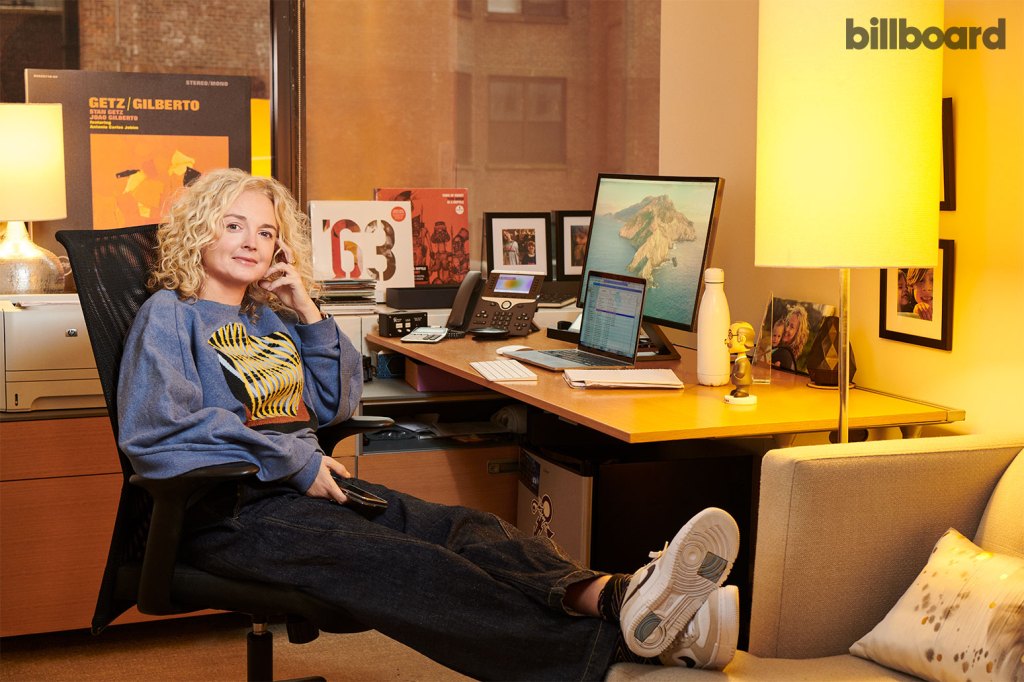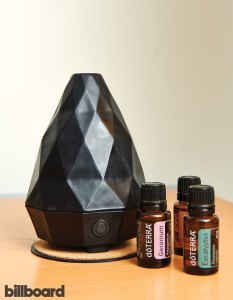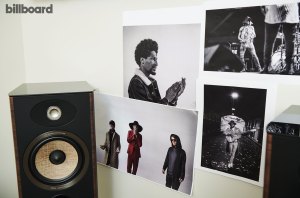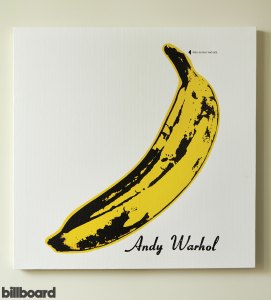Jon Batiste’s Grammy Noms Are Validation for Verve and the ‘Exciting’ State of Jazz

On Nov. 23, Dahlia Ambach Caplin was walking through her Brooklyn neighborhood, listening as a series of artists announced the nominations for the 2022 Grammy Awards. Over the course of an hour, as the genre categories and Big Four honors were revealed, one name kept surfacing again and again: Jon Batiste, the Late Show With Stephen Colbert bandleader whom Ambach Caplin had signed to the Verve Label Group in 2018. In all, Batiste scored 11 nominations, the most of any artist, including nods for record and album of the year for his single “Freedom” and We Are album, respectively.
“I was [multitasking] on a Zoom call, on a completely different subject, as all the album and record of the year stuff started coming out, and I was just like, ‘I can’t stay on the phone right now!’ ” she says. “That’s proof of concept. He’s an incredible artist, and I’m so happy for him because he’s such a hardworking, real talent.”
The nominations were the latest validation for Ambach Caplin, who was born and raised in Antwerp, Belgium, where her uncle ran the concert promotion company Make It Happen (which he sold to SFX in 2001). Having moved to the United States in the 1990s, she has worked for Verve for two decades. Her work identifying and signing artists to the iconic jazz label — founded in 1956 to release records by Ella Fitzgerald, it also became home to artists like Billie Holiday, Nina Simone and The Velvet Underground — has led to Grammy recognition for acts such as Tank and the Bangas, Ledisi and Herbie Hancock. She executive-produced the lattermost’s River: The Joni Letters, which won the album of the year Grammy in 2008. (Arooj Aftab, nominated for best new artist this year, is also distributed by Verve, though she was signed by A&R director Natalie Weber.)
Verve’s success comes as the jazz genre is making gains in sales and streaming — up 11% in album consumption units year over year in 2021 to date, according to MRC Data. It’s a boost in line with the growth of the industry as a whole.“Verve, historically, has always been about true, original talent,” she says. “So I think the philosophy is that we look for artists who have voices that don’t sound like anybody else and who are incredible at their craft.”

“Tommy LiPuma was an amazing human being and music genius who let Verve for many years,” she says of this bobblehead, which Verve head of sales Michael Kauffman made for a sales convention. “I often feel he’s still watching over us and hope we make him proud.”
Congratulations on the Grammy nominations. What is it like working with Jon Batiste and seeing him develop over the years?
He’s an incredible human being and an incredible artist. And it was very obvious from the first day I met him, which was at his piano teacher’s house many years ago. He was already doing his thing. It was before Colbert. He was doing shows and I was going to see him at the Blue Note or Rockwood [Music Hall in New York], and he always had this incredible way of getting the audience to get up and move. I’d never seen people dance to jazz, and he was able to communicate that. It’s very rare to see that.
What kind of impact can Grammy nominations have on an artist’s career?
Artists make the music that they make, and no one’s making music for awards. But what it does do is help bring opportunities and legitimacy in the business. We sometimes feel the impact like that. But artists just do their art, and we’re there to augment it by supporting it and giving it exposure around the world.
This is the second year in a row that Verve has had a best new artist nomination. What is your approach to A&R?
The criteria are that an artist be incredible at their craft and a one and only. I worked with Ledisi when she was a best new artist, and she was a unique voice in R&B. Arooj doesn’t sound like anybody else. Tank from Tank and the Bangas is an amazing musician, an incredible singer, rapper, spoken-word artist. She’s a triple threat, and then she’s supported by this incredible group of musicians. They all did so much work on their own to get traction. I view A&R development as providing the tools needed by the artist to achieve their artistic vision while helping them refine it.

“I find essential oils derived from plants nurturing, so I like having them around the office when calm and focus is needed.”
What are some of the keys to breaking a new artist, especially one who’s far outside of the pop realm?
The artists whom we choose to work with stand out, and we are very careful to make sure that our artists each have their own lane at Verve. That lets them focus on creativity while we amplify the music to the audience. We don’t have a strict template for marketing any more than we do for A&R. Verve is also like a family. We stay very close to what our artists need. Jamie Krentz, who runs Verve, is in touch with everyone on a daily basis.
Has your strategy become more global now that streaming has made the world a smaller place?
I’m from Belgium initially, so I tend to think quite globally. I started my career by touring around the world with Wayne Shorter, and then I did international, so it’s in my DNA. Our worldwide approach to developing artists is key. We’re based in the U.S., but we work with so many countries. We’re in almost daily touch with our teams in France, Germany, you name it, because you never know where an artist is going to start to get a buzz. Everything is smaller because of the internet. We no longer need to be somewhere to discover someone.
What’s the state of the jazz market now?
Exciting. (Laughs.) It’s better than it has been in years. There’s such a renewed interest — there’s an infusion of youthful talent and audience between London, Chicago, New York, Los Angeles. It’s amazing to go to festivals and watch people jumping up and down to Sons of Kemet or Kamasi Washington or The Comet Is Coming. The pool of talent has grown; there have been so many amazing artists to discover. And it’s no longer just about going to a jazz club. You can see jazz in many places. And that’s a testament to the agents and the bookers worldwide who are doing it.
To what would you attribute that broader acceptance?
One thing I would say is that because it’s in the hands of all these newer talents, you have people who are combining different sounds. They grew up listening to hip-hop and R&B in the U.S. and Caribbean, and Afrobeats in the U.K., and they’re channeling that in jazz. So people are just relating to it more. That’s an important factor I’ve noticed from the musicians that we’ve worked with.

“These are beautiful pictures of Jon Batiste, The Comet Is Coming and Ondara, taken by the great photographer and former head of creative at Verve Josh Cheuse,” says Ambach Caplin.
What are some of the challenges and opportunities in the jazz world for Verve?
The opportunity is that there are so many new live avenues. There were always great jazz festivals, but there’s a bigger blend happening now at a lot of places around the world, where you can see an R&B artist and a jazz artist at the same festival. Jazz remains a type of music that is challenging to some people, but I see more opportunity now than ever before because people are more receptive to it. Playlists are also a growing opportunity to expose people to jazz who otherwise wouldn’t be exposed to it.
How has the resurgence of vinyl affected Verve?
Jazz doesn’t stream like pop, so vinyl is essential for our revenue. We do a lot with Record Store Day — our revenue team works closely with all the accounts on that. The one major challenge we’re all facing since COVID-19 is the supply chain. But we’re delivering records earlier so we can meet those demands because it’s so important.
How has the rise of streaming changed your approach to your job?
A lot of great talent is now discovered by listeners looking around and doing deep dives. On the marketing side, we’re fully engaged on all levels, and it’s really important to work closely with all those accounts worldwide. It’s incredible for the catalog and for new artists, and it’s nice to see when cross-pollination happens and an artist that comes from a more jazz place gets onto a different kind of playlist. It has opened so many more avenues for the audience and for me personally — not just as a fan but as an A&R executive. So, on both ends, it has been a win.

The Velvet Underground & Nico album art. “I have this hanging at work and at home,” she says. “It’s an important album, I love listening to it, and it helped shape our vision for the label as it is today.”
Link to the source article – https://www.billboard.com/pro/dahlia-ambach-caplin-verve-jon-batiste-grammy-jazz/
Recommended for you
-
Donner DED-80 Electronic Drum Set with 4 Quiet Mesh Pads, 180+ Sounds, 2 Pedals, Throne, Headphones, Sticks, and Melodics Lessons
$299,99 Buy From Amazon -
Mackie MR824 8 Inches Powered Studio Monitor
$279,99 Buy From Amazon -
Raguso Mini Guitar Decoration, V-Shaped Guitar Model Surface Glossy Guitar Decoration Perfectly Shaped for Bedroom
$13,49 Buy From Amazon -
Kala Brand Music Co., 4-String Ukulele, Right, Natural, Ubass BMB-FS
$299,00 Buy From Amazon -
SONICAKE Guitar Bass Headphone Amp Mini Headphone Amplifier US Madness Rechargeable Pocket Chorus Effects
$27,98 Buy From Amazon -
Novation FLkey Mini – Portable 25-Key, USB, MIDI Keyboard Controller with FL Studio Integration for Music Production
Buy From Amazon -
Gold Tone OM-800+ Octave Mandolin (Mahogany)
$899,99 Buy From Amazon -
HyperX QuadCast – USB Condenser Gaming Microphone, for PC, PS4, PS5 and Mac, Anti-Vibration Shock Mount, Four Polar Patterns, Pop Filter, Gain Control, Podcasts, Twitch, YouTube, Discord, Red LED
$99,00 Buy From Amazon













Responses